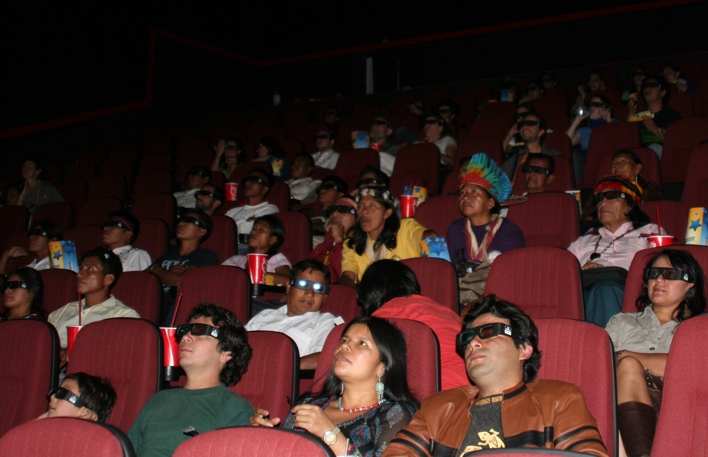Location, Ecuador: When your first cinema experience is Avatar in 3D
 Not intending to jump on the bandwagon of the Avatar-debating blogsphere, I have to bring up one interesting story from the global audience's experience. Early this year there was a special screening of the blockbuster movie in Ecuador for the Shuar and Achuar, indigenous minority groups in the nation. As reported on The World and in my favorite World in Words podcast, for many of these people, this was their first time ever visiting a movie theater and most certainly their first time for the strange 3D experience. Some had never seen a movie. After a 6-hour bus drive out of the Amazon and into the capital, Quito, the leaders of these groups took in the spectacle of a movie. For better or worse, it's pretty neat when a worldwide phenomenon can bring groups like these Ecuadorians into a theater to see for themselves what all the fuss is about. I suppose that's one measure of a pop culture success.
Not intending to jump on the bandwagon of the Avatar-debating blogsphere, I have to bring up one interesting story from the global audience's experience. Early this year there was a special screening of the blockbuster movie in Ecuador for the Shuar and Achuar, indigenous minority groups in the nation. As reported on The World and in my favorite World in Words podcast, for many of these people, this was their first time ever visiting a movie theater and most certainly their first time for the strange 3D experience. Some had never seen a movie. After a 6-hour bus drive out of the Amazon and into the capital, Quito, the leaders of these groups took in the spectacle of a movie. For better or worse, it's pretty neat when a worldwide phenomenon can bring groups like these Ecuadorians into a theater to see for themselves what all the fuss is about. I suppose that's one measure of a pop culture success.
Echoing their real life, the film touched on issues that these people are dealing with in their real lives: a battle against mining companies for the protection of their land. Their Amazonian homes contain vast amounts of oil, and they have seen an uprising that one of the audience members directly related to the Na'vi resistance in Avatar. "It's reality, what's happening now, just in another dimension," says Marlin Santi, one leader, whose words are translated; he feels the film could help bring highlight the abuse in the real, through the film's mirror on humanity.
When we compare the film to real life, however, there is an important aspect that is not new to this story; Achuar leader Lius Vargas brought up possibly the most idealistic, unfortunate aspect of the film, that of a white man sweeping in to rescue the indigenous people, becoming the liaison and the savior. "This is a Hollywood movie, so it's practically a given that a non-native comes to the defense of the people, and leads them to triumph in the end," says Vargas. The importance of a movie like this, or a book like Joseph Conrad's Heart of Darkness, published in pieces in 1899 and as a book in 1902, is that they spotlight some of the horrors that come along with imperialism--which was an important and shocking story for regular people in the western world in Conrad's time (arguably not so much of a shocker now). But both Conrad's and James Cameron's stories have that white man savior, continuing, albeit in a slightly more socially and politically aware manner, the underlying superiority of the "civilized" man. This largely does nothing to dispel the whole idea of the "white man's burden," that notion that he must spread his enlightened ways and rescue the world from its perceived "darkness." This underlying theme was obvious to Vargas as he watched the movie.
OK, I hopped on the bandwagon for a second there, but I swear I'm back on the ground now. Love it or hate it, that movie encourages chatter.
